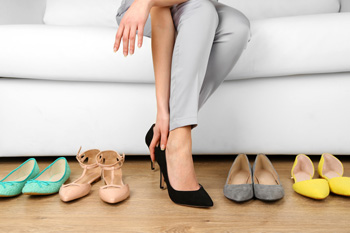 Wearing high heels can be a fashion statement. They can provide additional height, and can make the foot and leg appear slender. As desirable as they are to wear, there may be consequences that come with wearing this type of shoe. Common foot injuries that may result from wearing high heels can include sprained ankles, blisters on the toes or heels, or bunions. Additionally, patients may develop plantar fasciitis, which is an inflammation of the tendon that connects the heel to the toes. There are methods that can be implemented which may help the feet to feel better when high heels are frequently worn. These can include stretching the calf muscles which may help to protect against Achilles tendon injuries, and wearing shoes that have adequate room for the toes to move freely in. Additionally, it may be beneficial to alternate between wearing heels and flats. If you would like additional information about how high heels affect the feet, please consult with a podiatrist.
Wearing high heels can be a fashion statement. They can provide additional height, and can make the foot and leg appear slender. As desirable as they are to wear, there may be consequences that come with wearing this type of shoe. Common foot injuries that may result from wearing high heels can include sprained ankles, blisters on the toes or heels, or bunions. Additionally, patients may develop plantar fasciitis, which is an inflammation of the tendon that connects the heel to the toes. There are methods that can be implemented which may help the feet to feel better when high heels are frequently worn. These can include stretching the calf muscles which may help to protect against Achilles tendon injuries, and wearing shoes that have adequate room for the toes to move freely in. Additionally, it may be beneficial to alternate between wearing heels and flats. If you would like additional information about how high heels affect the feet, please consult with a podiatrist.
High heels have a history of causing foot and ankle problems. If you have any concerns about your feet or ankles, contact one of our podiatrists from New England Foot and Ankle. Our doctors can provide the care you need to keep you pain-free and on your feet.
Effects of High Heels on the Feet
High heels are popular shoes among women because of their many styles and societal appeal. Despite this, high heels can still cause many health problems if worn too frequently.
Which Parts of My Body Will Be Affected by High Heels?
- Ankle Joints
- Achilles Tendon – May shorten and stiffen with prolonged wear
- Balls of the Feet
- Knees – Heels cause the knees to bend constantly, creating stress on them
- Back – They decrease the spine’s ability to absorb shock, which may lead to back pain. The vertebrae of the lower back may compress.
What Kinds of Foot Problems Can Develop from Wearing High Heels?
- Corns
- Calluses
- Hammertoe
- Bunions
- Morton’s Neuroma
- Plantar Fasciitis
How Can I Still Wear High Heels and Maintain Foot Health?
If you want to wear high heeled shoes, make sure that you are not wearing them every day, as this will help prevent long term physical problems. Try wearing thicker heels as opposed to stilettos to distribute weight more evenly across the feet. Always make sure you are wearing the proper shoes for the right occasion, such as sneakers for exercising. If you walk to work, try carrying your heels with you and changing into them once you arrive at work. Adding inserts to your heels can help cushion your feet and absorb shock. Full foot inserts or metatarsal pads are available.
If you have any questions please feel free to contact one of our offices located in Chelmsford and Newburyport, MA . We offer the newest diagnostic and treatment technologies for all your foot and ankle needs.
